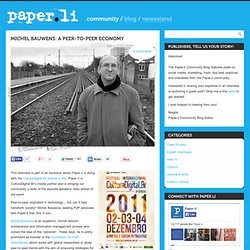

Lessons from SOCAP 2012: trend towards social impact investing continues. There may not be enough money to solve the world's increasingly complex problems, but capital is gravitating towards investments that have a positive social or environmental impact.

Delegates at the recent SOCAP 12 conference, an annual event dedicated to increasing the flow of capital towards social good, heard how the emerging field of "impact investing" is seeking to achieve more than just making a buck. As financial returns from traditional investments limp along at low levels because of the global economic and financial crisis, impact has become an important differentiator among investors. "Impact investing is an enormous opportunity for people, not only to get a return on their investment, but to also help make an impact on major societal needs at the same time – the two can go hand in hand," said Jed Emerson, chief impact strategist at ImpactAssets, a non-profit social investment company. Social Entrepreneurs Hack Capitalism. Think Like a Family. President Obama’s current appeals to fairness — as in the wealthy paying their “fair share” and letting ordinary Americans have a “fair shot” at a middle class life — will likely do more harm than good for those of us who care about economic equality.

A Gallup poll conducted in mid-December reports that 58% of Americans polled say that they do not see society divided into “haves” and “have nots” despite Occupy Wall Street’s efforts to highlight growing economic inequality. The references to fairness appear to be the Democrats’ attempt to capitalize on the rhethoric of the 99%, a tactic they should seriously reconsider as it will likely backfire with serious consequences to our nation. Fairness is inevitably in the eyes of the beholder. If the President and the Democrats actually want a more equitable distribution of wealth, then they should pretend they are managing a household or large family, rather than running a business.
S blog » Blog Archive » Multidimensional value and the future of transactions. I was talking recently to people who have been using our neighborhood rewards debit card in Bernal Heights, and they mentioned:

Blueprint for P2P Society: The Partner State & Ethical Economy. A new way to produce is emerging.

By this I mean: a new way to produce anything and everything, whether it is software, food, or cities. What once required rigid organisations and a society defined by the mentality of hierarchies, we are discovering now (and in many cases re-discovering) how to do through free association of peers. It is also becoming clear that entering an era defined by an ethos of free association and horizontality doesn’t mean institutionality itself will dissappear, but that it will undergo the deepest of transformations.
In the emerging institutional model of peer production, most visibly in the free software industry, we can distinguish an interplay between three partners: A community of contributors that create commons of knowledge, software or design; An enterpreneurial coalition that creates market value on top of that commons; and A set of for-benefit institutions which manage the "infrastructure of cooperation" Cancers or Endowments « Reading Nature's Signals. In Continuing the Conversation on Resilience John Fullerton offered a provocative summary and invited more comments on the subject that started with examples found from Bill Reese and Donnella Meadows of resilience as “a Double Edged Sword”, like either social or biological diseases that change to become resistant to treatment.

My comment on it got to be 1000 words…, so I just posted the introduction there, and continue it here, where I also can edit it if needed. Hmmm…. I think I both agree and disagree with all three, Geoff, Dave and Ted. I’m sure they’d point out problems with how I fit the various issues together, the way I draw the bigger picture too, of course. The reality we’re looking for will need crucial parts contributed from many different perspectives, as no one sees what a complex society needs to work by themselves. Taleb on Antifragility. 14 Ways an Economist Says I Love You. Global Economics Gets a Facelift With The Atlas of Economic Complexity - Business. Launch Slideshow Economists Ricardo Hausmann and César Hidalgo released their Atlas of Economic Complexity at the Harvard Center for International Development on Thursday.

The 300-plus page atlas is unlike any you’ve seen before—it doesn’t inform readers where they are geographically, and it won’t be any help when charting pan-continental adventures. But from an economic perspective, the atlas will tell readers where their countries rank in terms of productivity—and, most astonishingly, where it will be in 10 years. It’s not a crystal ball, but it could very well be a map for global investment over the next decade. Plus, it sure is pretty to look at. The atlas starts with the idea that the wealth and potential of nations is derived from productive knowledge. Michel Bauwens: A peer-to-peer economy. This interview is part of an exclusive series Paper.li is doing with the CulturaDigital.Br festival in Rio.

Paper.li is CulturaDigital.Br’s media partner and is bringing our community a taste of the keynote speakers’ talks ahead of the event. Peer-to-peer originated in technology… but can it help transform society? Www.plancanada.com/capitalism3.pdf. Welcome to the Metacurrency Project. MetaCurrency Collabothon in NY, October 21-23 - P2P Foundation. Bitcoin and ethics. Wealth creation and macroeconomics: The parasite problem.